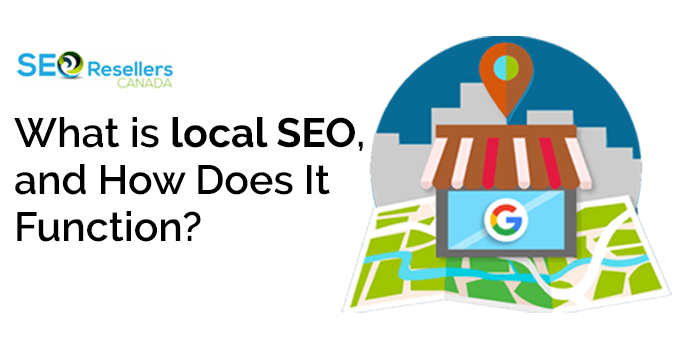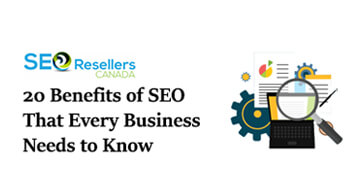There seems to be no end to the growing list of online buzzwords lately, which makes digital marketing even more challenging than before. The most popular terms in online marketing are undoubtedly SEO and Google AdWords. So, what’s the difference between these two?
Google has long been an advocate of keeping their paid and organic search results separate. To a large extent, they have been successful in defining the key variables and factors involved. Yet, the two marketing methods are becoming quite similar to one another.
Most users rely on organic search traffic for their research, and they largely ignore Google Ads. However, a larger bulk of Google’s revenue comes from the ads they run based on keywords. Google has been around for so many years that users are now becoming smarter at avoiding ads, and they trust organic results a lot more.
AdWords is Google’s way of monetizing their powerful search engine for businesses that want to sell their products and services.
SEO or search engine optimization means increasing your online visibility by creating high-quality content with the right keywords. Organic results are usually shown below the ads. In case a website doesn’t have that kind of leverage, businesses can always pay Google to appear on the front page of the search results.
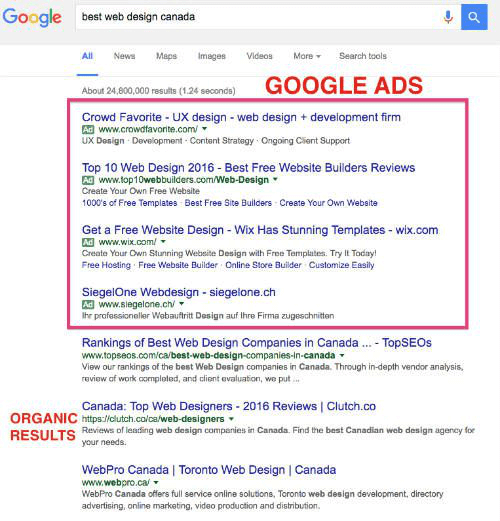
Every time a user clicks on the ad link, Google charges the company even if the click didn’t lead to a conversion. Many businesses depend on Google AdWords to show up on search results for extremely competitive keywords they cannot rank for organically. The end goal for most businesses is to rank for these keywords organically in the long run.
So why should Google allow the top 10 companies to organically rank for such competitive keywords? Isn’t it counterintuitive for Google? The answer is that only a handful of companies get to enjoy being on the front page of the internet, while others compete with each other to secure a ‘prime’ spot. The first few results are chosen based on how informative their content is and how often they are referred to (in other words the backlinks).
The truth is that exceedingly common keywords like ‘mouse’ or ‘keyboard’ are extremely difficult to rank for since the companies that have acquired them won’t leave without a fight. For example, the search results for the term “keyboard” include Amazon, Logitech, and Wikipedia.
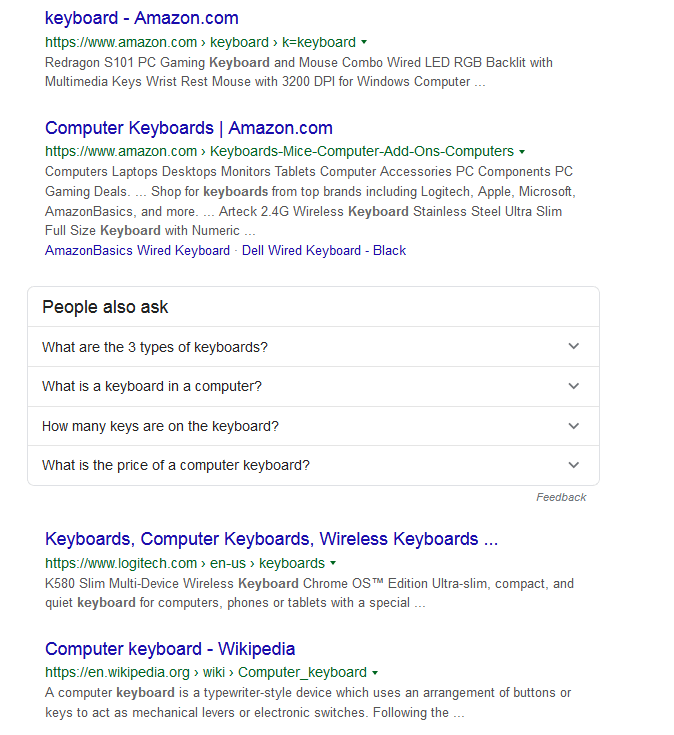
Think of AdWords as a ‘cheat sheet’ to help you move to the top search results. You just need to cough up more cash to achieve this feat, and that too for a specific time.
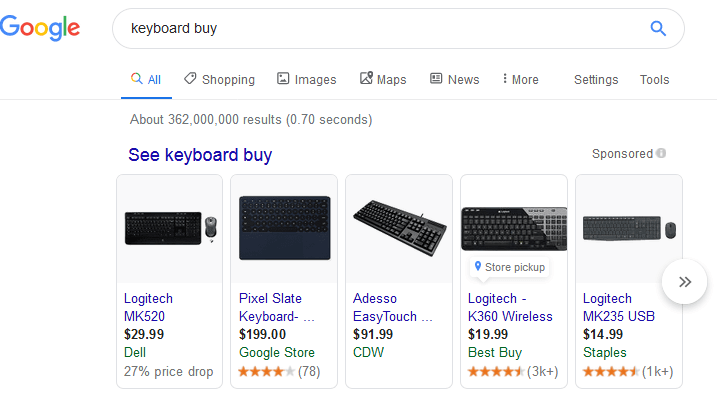
A glance at the top of the results page shows websites like CDW, Staples, and Best Buy ranking on the top page thanks to AdWords. Smaller companies can get to the first page of the search engine results, thanks to AdWords.
1- But isn’t AdWords being unfair to companies that rank organically?
The answer is no because most people still consider organic results to be superior to ad results, and they would rather place their trust in Amazon than Best Buy.
2- Is AdWords Pointless for Smaller Companies Then?
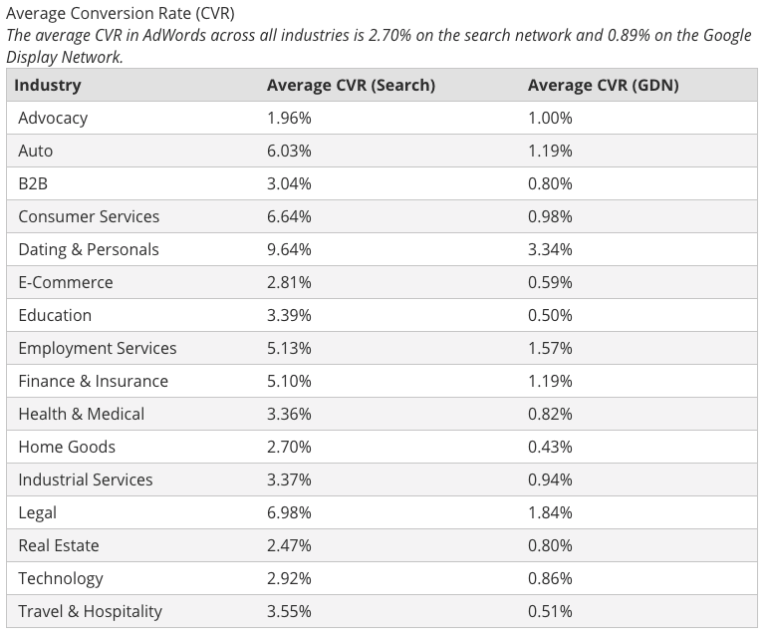
No. AdWords is the best thing that happened to small websites that are otherwise facing a hard time cracking search results. It gives smaller companies access to a wider audience that has a higher disposable income. By running ads on Google AdWords, companies can push their way to the front page and start selling. The revenue they generate can be used to reinvest in Google AdWords, and so on.
This starts a positive feedback cycle that is self-sustaining as long as your leads are converting. Lead conversion isn’t necessarily easy. Not all clicks on your ads will lead to conversion and a reasonably large portion of your leads will abandon the website right after the first click. This is a bitter pill to swallow, but one that you’ll have to come to terms with sooner than later.
Below is a list of numbers that compare the conversion rates by the industry for both organic search and paid search.
From the above chart, it becomes painfully obvious that the average conversion for ads across all industries is less than 5%. As it turns out, organic traffic is a gift that keeps on giving since conversion is much higher on average than paid search. Yet, if you were to directly compare Google Ads conversion rates with other sources of advertisements, such as Social channels, backlinks, tradeshows, and more, you’ll realize that AdWords has the highest ROI and conversion rate.
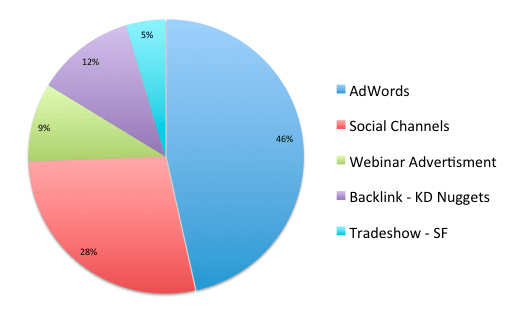
Don’t discount AdWords because of the low conversion rate because this is just how the market is, in general. Some niches perform better than others, and if you’ve got a decent landing page, you’ll convert even more.
3- What Are the Different Roles of Google AdWords and SEO?
Both AdWords and SEO have complementary roles. SEO revolves around making your site more appealing to clients by creating content that engages them. It includes not only the content material but also the site layout, design, and the use of videos and infographics. In general, Google bases its ranking on several factors such as user-friendliness, ease of navigation, age of the website, and the quality of the content itself.
In many cases, organic traffic is geared towards the more general audiences who may not be interested in buying a product or service. Google AdWords let you target users who are actively searching for your product and service, thereby giving you visibly for important keywords.
Successful companies use both SEO and AdWords to appeal to both sides of their audiences. This involves building a steady rapport with users who are seeking content through SEO and selling products and services to users who are genuinely interested in buying them.
4- What if We Make the Two Work Together?
Google wants companies to use both AdWords and SEO properly. Brands that accurately track their organic traffic and rankings can strategically use AdWords to increase their visibility for important keywords. Google lets you test your audiences for particular keywords that they are prone to clicking.
Keywords that bring in more visitors with higher conversion will take priority over keywords that do not enjoy as much success. AdWords are used to uncover keywords that have high search results but low competition, meaning that it will be easier for a site to earn a slot on the front page with ads.
This is a process that requires continuous refinement from both sides.
5- Optimizing Google Ads Based on Your Budget
The great thing about Google AdWords is that it has a relatively low barrier to entry. Google works with a wide range of businesses, even the ones that have a shoestring budget.
The first thing you will need to do before investing in AdWords is to define your budget. Google AdWords are spread across a variety of networks and devices, including mobile, desktop, and tablets.
People who are using Google’s products such as the Google Play Store App, Chrome, or other Google-owned products allow the company to show them advertisements.
AdWords allows companies to place bids on mobile, desktop, and tablets separately. This means you can segment a particular budget for each device uniquely or bundle them all together, giving you a free rein on how to spend your money. To help you get the most out of your budget, you will need to analyze the more important keywords that you should be targeting. Without proper analysis, you’ll see your thousand-dollar budget drain out pretty fast.
Google rewards companies that think smart instead of squandering their budget in the hopes of securing audiences. You will now need to start focusing on which ad format you are going after: is it image, video, responsive, text, call-only, etc?
6- Google Maps Also Include Ads
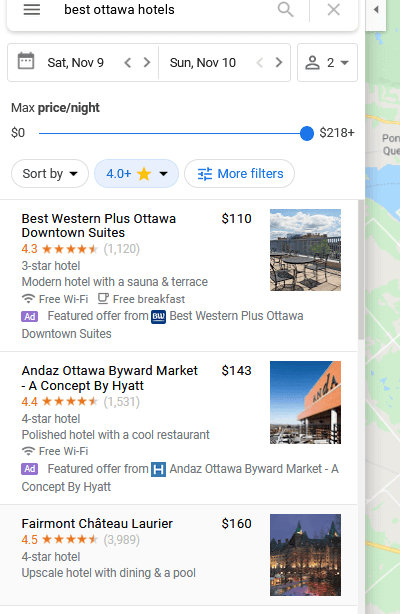
It was only a matter of time before Google decided to run ads on Google Maps. This applies to their desktop, app, and mobile version. As users search for local businesses, they will get ads showing sales, deals, promotions, and other offers with some of the business’s logo included to help them identify where the ad came from.
7- Expanded Text Ads

Text ads are Google’s most basic ads. This doesn’t mean they are any less powerful. Google’s expanded ads now include three headlines with two 90-character descriptions and three 30-character headlines. This makes it extremely easy to boost your conversion rate and by providing more information about your business.
Here is an example of DreamHost utilizing this feature.
This extra space works across all devices, desktop and mobile included and will automatically wrap based on the size of the device. These improvements mean your ads are nearly twice as large with up to 300 characters.
8- Responsive Display Ads

Google only recently rolled out its Responsive Display Ads which is a new ad format that helps advertisers display designer quality ads with ease. Advertises can provide an image and logo that will appear in native ad formats and rich media ads. Google previously took this image from Google+ accounts and client websites to power their richer text ads on the display network; this resulted in less than ideal ads.
These responsive ads give more control to brands and much more space for content. Companies can upload a logo, an image, and advertise name to exert more control over their branding.
9- SEO Strategies
We’ve noted one pattern in SEO that works every time: being persistent and consistent. That’s key if you want to thrive. Even if your throughput for content is low, as long as you are consistent enough (with a frequency of at least weekly blog posts), Google will give your blog a chance to break the ice.
But if you want to speed things up and start ranking fast, you’ll need a few SEO strategies.
10- Link Building
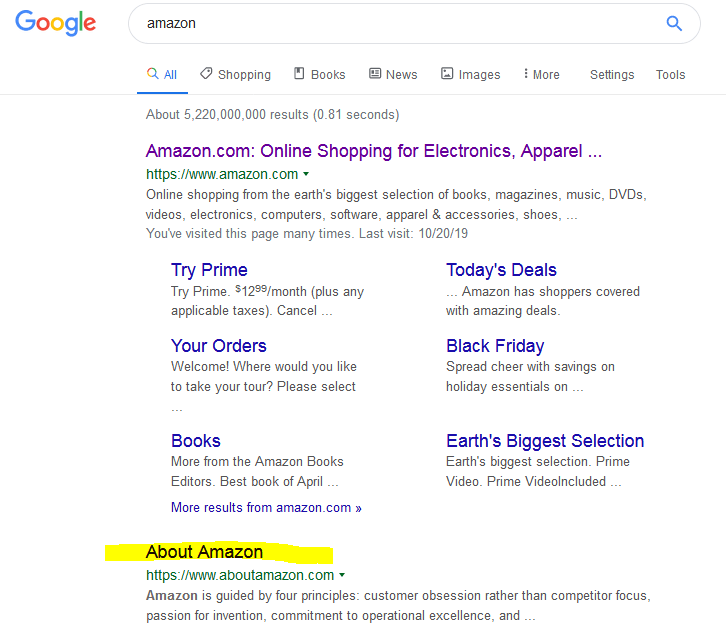
Whenever a third-party website links back to your website, you generate a backlink. Does Google thrive on user experience and reviews, and what better way of attesting a website’s authority than similar websites linking back to it? Backlinks are one of the most important factors considered by Google’s algorithms when it comes to boosting your rank. If you have built a steady source of credible links from various sources then Google responds by increasing your rank.
Take a look aboutamazon.com for instance, owned and operated by Amazon.com;

With over 14,000+ websites linking back to it, there’s no stopping aboutamazon.com to climb up the first page and dominate the keyword ‘Amazon’.
11- Guest Blogging Generates Backlinks
The most effective way to create backlinks is by hunting for related websites with a blog. Simply reach out to the webmaster about contributing to their blog in exchange for one link. One little link didn’t harm anyone, besides you’re giving the blog one free quality article. Keep doing this with similar websites and you’ll be sure to increase your rank with Google.
12- Optimizing the Metadata

The metadata is the most valuable information that is used by search engines to display to users. Search engine crawlers find it increasingly easy to rank a page higher if they rank for a search query. Metadata for SEO requires the use of meta title and meta description. You can use Yoast SEO to optimize the meta details and see them in real-time.
In the picture above, travelandlesiure.com shows up for the keywords “hotel in Canada”. This is because the description includes the tags “Hotel” and “in Canada,” even though they are split apart.
13- Target Long-Tail Keywords
Since shorter keywords such as “keyboard” are extremely competitive, your next best option is to focus on long-tail keywords since they are more commonly searched for and will have a higher value of conversion. Long-tail keywords are easier to rank for and are bound to attract more motivated audiences with deep pockets.
A good target keyword should be “mechanical gaming keyboard in Ottawa.”
14- Which Is More Expensive? SEO or Google Ads?
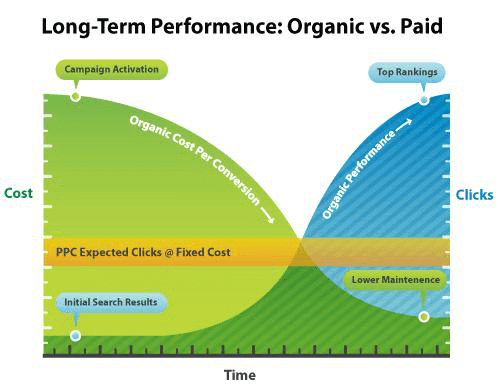
The truth is that both Google Ads and SEO will take your time and money.
SEO may give you long term results somewhere in the future, but the first few months of endless grinding are painstakingly expensive since so much time and effort goes into optimizing the content on a website. This is usually a trial-and-error process that backfires if you haven’t done proper keyword research.
This is where it makes sense to have an SEO specialist in Canada handle both the research and content side of things for you. Of course, you can do good research on your own, but you may need to use high-quality online tools to carry out a proper competitor and content research. Possible options include Ahrefs, SEMrush Moz, and SpyFu.
Google has identified over 200 factors that it considers into organic search ranking, and a professional SEO agency reviews all of these different aspects to optimize both website and content.
If done right, SEO will pay you back multiple folds. But if not, it will disappoint since you won’t be able to generate as much traffic as you expected. The most important resource for clients is to pay for quality link building which takes both time and resources but is ultimately one of the more important factors used by Google.
Google Ads, on the other hand, are a lot more expensive thanks to clicks and conversions. You are essentially throwing away money to make more money. This only works if your leads decide to buy your content. Since so much money is involved in Google Ads, it is advisable to have someone professional do it for you since they usually know what they’re doing and won’t be making any mistakes. Fewer mistakes mean you can spend more on your ad budget.
Although both organic and paid traffic requires you to pour a ton of money into them, the obvious long term benefits of organic traffic far outweigh paid traffic as can be seen from the graph above. As long as you rank high for a particular keyword, you will dominate the market without spending money for each click.
15- Bottom-line: New Companies Should Start with AdWords
When you first start your website, your main goal is to attract clients. Since your website doesn’t have many keywords, it’s going to be difficult to generate clients based on organic traffic alone. The best thing to do right now is to create internet marketing campaigns to raise awareness and get some traffic from search engines. This may be the goal now, but in the coming months and years, your eventual goal should be to capture as many relevant keywords as possible. AdWords simply work a lot faster to help you generate results.
SEO, although it will pay off, will start very slow compared to PPC. Also, when you’re just getting started, you are probably not sure which keywords to rank for and write content for. Working with AdWords first gives you an idea of the number of keywords you should be targeting. It can take you a few weeks or even months to start ranking higher but the results are well worth the effort.
Schedule a free consultation with SEO Resellers Canada to discuss how our experts can benefit your website’s SEO. Give us a call today!



















